Michigan's gun laws change: Background checks, storage, temporary removal
LANSING — Michigan gun laws have changed, with new laws related to universal background checks, gun storage, and temporary removal of guns from people a judge deems dangerous, all taking effect Feb. 13, 2024.
The Michigan Legislature passed the new laws last spring after Democrats, who already controlled the governor's office, flipped both the state House and Senate from red to blue in the November 2022 election, giving that party its first "trifecta" in Lansing in 40 years.
Though the measures had been part of the Democrats' legislative agenda for years, the speed with which they were passed was likely influenced by two mass shootings in Michigan. On Feb. 13, 2023, Anthony McRae, 43, of Lansing killed three Michigan State University students and injured five others before leaving campus and fatally shooting himself. Before that, on Nov. 30, 2021, Oxford High School student Ethan Crumbley, then 15, used a gun his parents bought him to murder four students and injure six students and a teacher. Crumbley has pleaded guilty and faces multiple sentences of life in prison.
Because they passed by narrow vote margins, the gun bills Gov. Gretchen Whitmer signed into law did not take effect immediately. Instead, they become effective on the 91st day after the Legislature adjourns for the year in 2023. Adjournment usually happens in late December, meaning the bills would take effect in the latter part of March 2024. But this year, lawmakers adjourned early, in November, and as a result the bills take effect in February.
What's the new law on background checks?
Under Public Act 19 of 2023, along with Public Act 18 and Public Act 22, all Michigan gun sales generally require the buyer to undergo a background check.
That's a big change from the previous law, under which only handgun buyers were subject to a background check in order to obtain the required purchase license, though some federal criminal background checks were also required for firearms other than handguns when purchasing from a federally licensed dealer.
The new law essentially replaces the word "pistol" in state law with the word "firearm," extending the requirement to first obtain a license — and undergo a state background check — to rifles and shotguns.
Prospective gun purchasers can appear at any local law enforcement agency and, after successfully passing the background check conducted through the Michigan State Police, obtain a purchase license after signing a sworn statement that they meet Michigan qualifications.
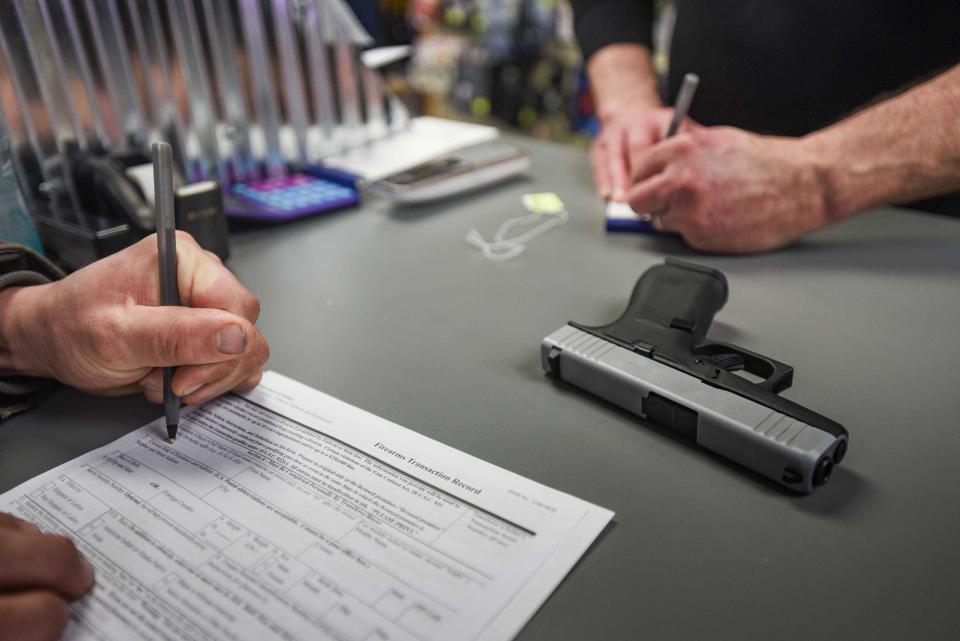
The law applies the same to firearms obtained as gifts as it does to firearms that are purchased.
Someone on leave from the U.S. armed forces or discharged from active duty who brings a firearm into Michigan would have to obtain a license for it not more than 30 days after entering the state.
Gun sales that take place prior to the effective date of the new law are exempt from the new requirements.
Also, once the new law takes effect, anyone purchasing a shotgun or rifle is exempt from the requirement to get a license if they undergo a background check through a federally licensed gun dealer within five days of making the purchase.
What if I inherit a gun?
Under the new law, anyone who inherits a firearm is required to obtain a license — and thereby undergo a background check — no more than 30 days after taking possession of the gun.
If the person designated to inherit the firearm is not qualified for a license, they can ask the next of kin or executor of the estate to dispose of the gun in any lawful manner.
Are there exceptions to the licensing requirement?
Those who hold concealed pistol licenses at one time were generally exempted from the requirement to obtain a license before purchasing a gun, but that is no longer the case. Those who are exempted from the requirement include federally licensed firearms dealers, gun dealers purchasing from wholesalers, and police officers licensed under the Michigan Commission on Law Enforcement Standards Act.
The licensing requirement also does not apply to the purchase or sale of guns not made for modern ammunition that are kept as relics or curiosity items, or to guns that have been made permanently non-functional.
Non-residents of Michigan who are in possession of a license from their home state to purchase, carry, or transport a pistol are exempt from state licensing requirements to purchase a gun.
What are the penalties for violating the licensing/background check law?
Purchasing or possessing a handgun without obtaining a license is already a misdemeanor punishable by up to 90 days in jail and a fine of up to $100. The new law extends that beyond handguns to all firearms.
A person who forges any item on an application for a gun license, or who makes a materially false statement on a gun sale record, is guilty of a felony punishable by up to four years in prison and a fine of up to $2,000.
A person who attempts to use false identification to purchase a firearm is guilty of a misdemeanor punishable by up to 90 days in jail and a fine of up to $100.
Hands-free driving: Detroit is most dangerous city for driving; Michigan law working, studies find
Who can/can't buy a gun in Michigan?
State and federal laws don't treat gun purchases identically. You must be at least 18 to purchase a gun in Michigan. To purchase a handgun from a federally licensed dealer, you must be at least 21.
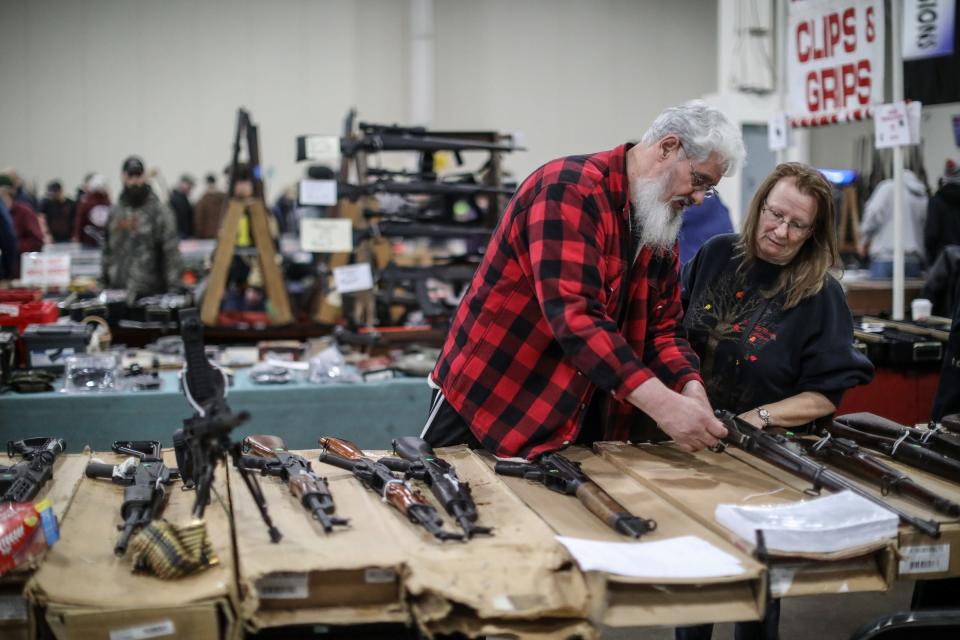
Anyone convicted of a felony is barred from possessing a firearm under federal law, as is anyone convicted of misdemeanor domestic violence. Federal and/or state law also prohibits gun possession for numerous other reasons, including anyone under an anti-stalking court order related to an intimate partner or their child, anyone who is a fugitive from justice, anyone judged "mentally defective" under federal law or committed to a mental institution, any non-citizen who is unlawfully in the United States or anyone who has renounced their U.S. citizenship, anyone unlawfully using or addicted to any controlled substance, though that federal law is being challenged, and anyone subject to an "extreme risk protection order" under a "red flag law" such as the one recently passed in Michigan.
What's the new "red flag" law in Michigan?
Under another new state law that takes effect Feb. 13, 2024, Public Act 38 of 2023, Michigan judges can issue an "extreme risk protection order" to remove guns from someone deemed to pose a risk of serious harm to themselves or others.
More than a dozen other states have similar laws, commonly known as "red flag laws."
Judges are to consider such orders after being petitioned by a family member, a law enforcement officer, a medical provider, a former spouse, or someone who used to date or live with the person in question. The court must give notice of the petition to the affected person, and give them an opportunity to participate in a hearing on the petition, except in a case deemed an emergency.
Such an order, which expires after one year unless the court extends it, can be sought to prevent someone from obtaining a gun, even if they do not already possess one.
After considering a range of potential evidence, a judge "shall issue an extreme risk protection order if the court determines by the preponderance of the evidence that the respondent can reasonably be expected within the near future to intentionally or unintentionally seriously physically injure himself, herself, or another individual by possessing a firearm, and has engaged in an act or acts or made significant threats that are substantially supportive of the expectation."
The court's order should specify whether guns are to be removed immediately or within 24 hours. If they are to be removed immediately, the court must also issue a search warrant, in case police need it when serving the order. If the guns are to be removed within 24 hours, they must be surrendered to law enforcement, though the court, at its discretion, can allow the guns to be surrendered to specified licensed gun dealers. When guns are seized by or turned over to law enforcement, police must store the weapons so the owner can recover them once the order is lifted.
If the order was issued without providing notice, the court must hold a hearing on the order within five to 14 days, if requested. The law also provides for hearings to modify or rescind the order, once it has been imposed.
What are the penalties for violating the 'red flag' law?
Violating such an order subjects the restricted person to immediate arrest and the criminal contempt powers of the court, including up to one year in prison for a first violation and up to five years for a subsequent violation.
Failing to comply with an extreme risk protection order is a felony punishable by up to one year in prison and a fine of up to $1,000.
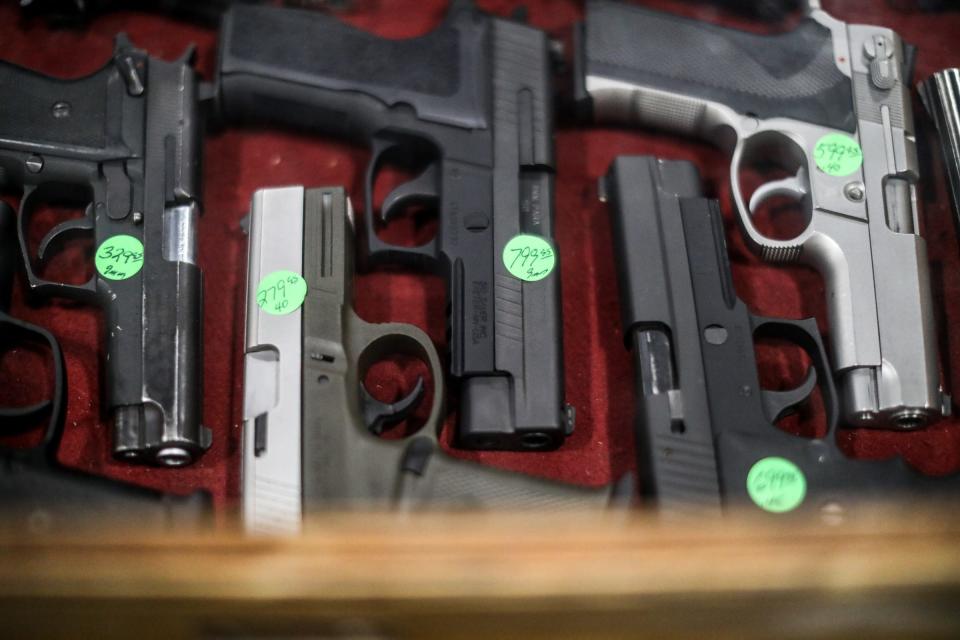
Someone who petitions the court for such an order and knowingly makes a false statement is guilty of a misdemeanor punishable by up to 93 days in jail and a fine of up to $500.
Anyone who knowingly provides a gun to someone who is subject to an extreme risk protection order is guilty of a felony punishable by up to one year in prison and a fine of up to $1,000.
How does Michigan's new gun storage law work?
Under Public Act 17 of 2023 and related legislation, someone in control of a home or other property who has reason to believe a minor is likely to be on the premises is required to store unattended guns in a locked container or keep them unloaded and locked with a device such as a trigger lock or cable lock. The law also applies to someone who leaves a gun unattended at a property controlled by someone else.
The law is worded so that enforcement can only occur if a minor gains access to a gun that should have been locked. In other words, a gun owner could not be charged under the law if a police officer entered a residence and found an unsecured and unattended gun. Instead, a violation only occurs if a minor obtains the unsecured gun and other events occur.
If the minor possesses the gun in a public place or possesses it in the presence of another person in a reckless or threatening manner, the person who failed to secure the gun is guilty of a misdemeanor punishable by up to 93 days in jail and a fine of up to $500.
If the minor fires the gun and injures themselves or someone else, the person who failed to secure the gun is guilty of a felony punishable by up to five years in prison and a fine of up to $5,000.
If the minor fires the gun causing serious bodily injury, the penalty is up to 10 years in prison and a fine of up to $7,500.
If someone gets killed, the penalty increases to up to 15 years in prison and a fine of up to $10,000.
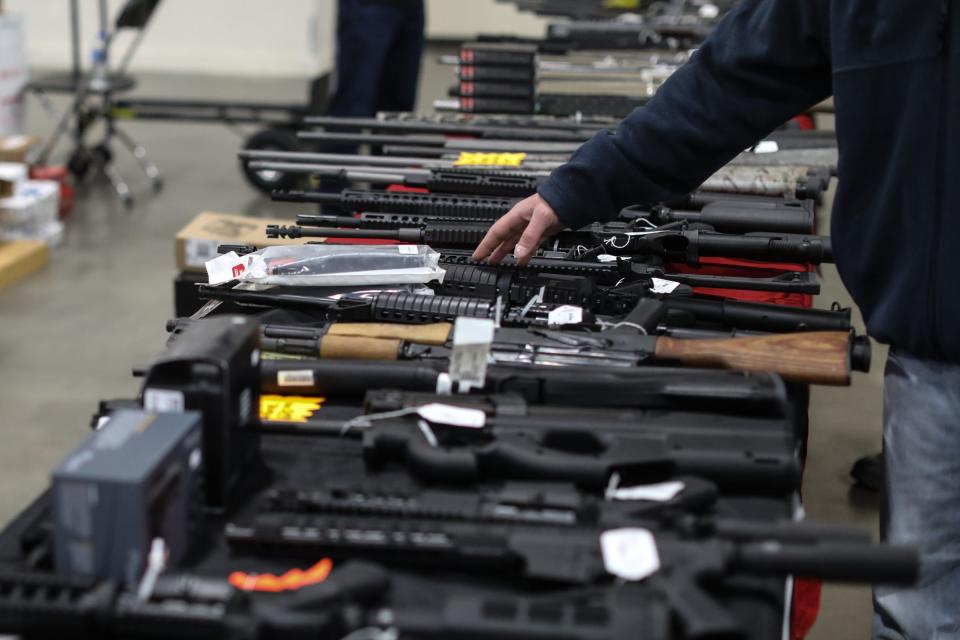
The law provides exceptions in cases where the minor obtains the gun under the supervision of a parent or guardian or after breaking into a property or vehicle, or where the minor is acting in lawful self defense or defense of another person.
To encourage compliance, the new law gives tax breaks on the sale of gun safety devices, such as gun safes and gun locks. It removes the 6% sales tax from such purchases, beginning 90 days after the effective date of the law and ending Dec. 31, 2024.
Where and how can a weapon be legally carried in Michigan?
Though there are restrictions, it is generally legal to carry a firearm in public in Michigan as long as the intent is lawful and the firearm is not concealed, according to the Michigan State Police. This is known as "open carry," and it is legal because there is no law prohibiting it.
Michigan residents can also obtain permits to carry concealed handguns. Michigan is a "shall issue" state for concealed pistol licenses, meaning anyone 21 or older can obtain one provided they are not otherwise prohibited, they pay the required fee, and complete required firearms safety training.
Places in Michigan where "open carry" is generally banned tend to be the same "gun-free zones" where concealed carry is generally banned.
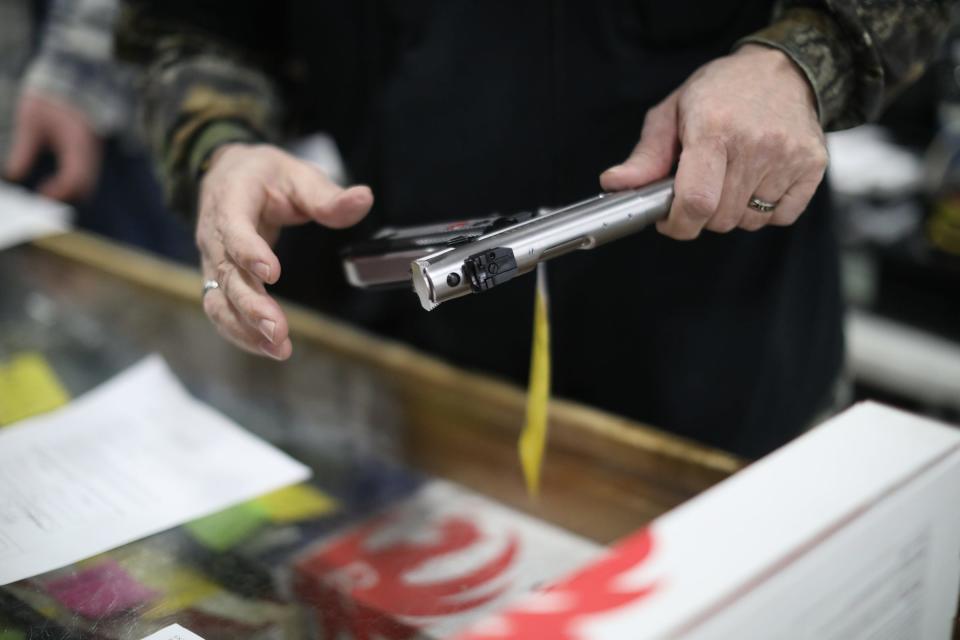
They include schools, though parents and guardians with concealed pistol licenses may carry a firearm in a vehicle on school property while picking up or dropping off a child.
Other banned places include churches (except with permission of church leaders), courts, theaters, sports arenas that seat 2,500 or more people, day care centers, hospitals, casinos, and places where the licensed sale of alcohol, consumed on the premises, is the primary source of income.
Most recently, the Michigan Capitol Commission voted to generally ban guns inside the Capitol in Lansing. Plans are underway to install detectors to help enforce that policy.
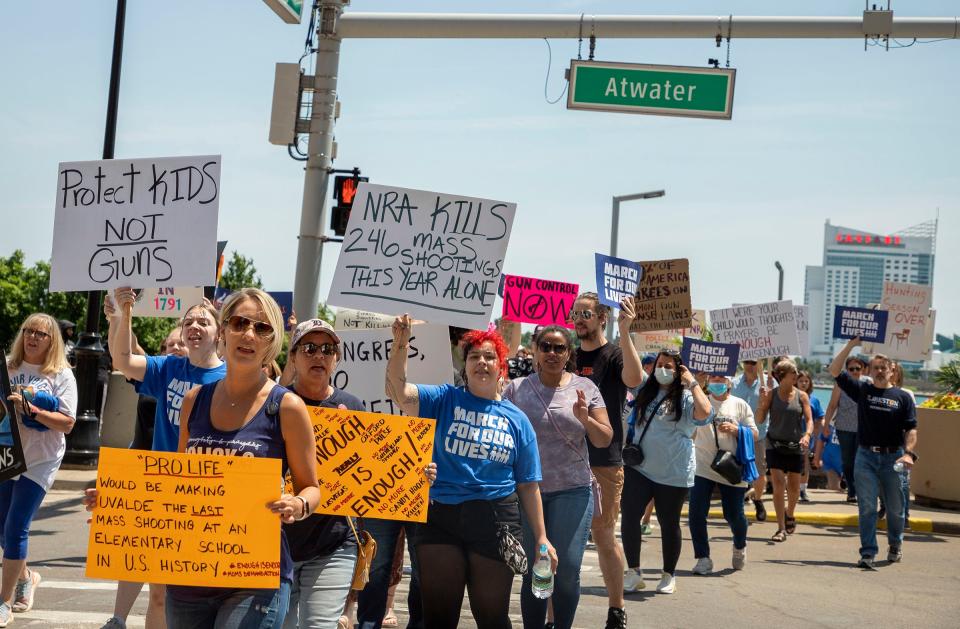
In July, the Michigan Court of Appeals upheld the University of Michigan's campus gun ban, ruling that despite the Second Amendment giving citizens the right to bear arms, universities are considered “sensitive places” where firearms possession can be regulated by governing bodies.
In 2018, the Michigan Supreme Court ruled 4-3 that the Ann Arbor and Clio school districts have the right to ban guns from their schools, upholding a 2016 ruling by the Michigan Court of Appeals.
State law prohibits a "local unit of government" from banning the possession of firearms. The court ruled that the local government ban did not apply to school districts.
In 2013, a Michigan Court of Appeals ruling that said the Capital Area District Library in Ingham County could not ban "open carry" of firearms was allowed to stand when the Michigan Supreme Court declined to hear the case.
Owners can ban firearms from their private establishments, regardless of open carry rights and concealed carry laws.
Michigan Supreme Court: No-fault overhaul doesn't apply to 15,000 catastrophic survivors
Why are semi-automatic rifles legal?
From 1994 to 2004, federal law prohibited the manufacture, transfer or possession of 19 semi-automatic weapons as well as other firearms that were either copies of the prohibited weapons or had detachable magazines and other specific features similar to those weapons. The legislation, which was fiercely opposed by the National Rifle Association, had a sunset date and after it passed, the law was never re-enacted.
Are bump stocks legal?
A bump stock is an accessory that allows a semi-automatic weapon to fire rounds more quickly and function more as a fully automatic weapon. The device became well known after a shooter made extensive use of them during the October 2017 shooting in Las Vegas that killed 58 people.
Bump stocks became illegal in 2018 under a ban issued by the U.S. Justice Department at the direction of former President Donald Trump.
However, that ban has since been overturned by two federal appeals courts, including the U.S. 6th Circuit Court of Appeals, which has jurisdiction over Michigan.
Therefore, bump stocks are lawful in Michigan, at least for now, as cases head to the U.S. Supreme Court.
What about so-called 'ghost guns'?
Guns that can be assembled from kits that are frequently sold online, often referred to as ghost guns, are a concern to many law enforcement agencies because they lack serial numbers and are difficult to trace when used to commit crimes. Also, purchasing parts can in many cases be done without the paperwork and licensing required to purchase an assembled gun.
In 2022, the administration of President Joe Biden imposed rules that require manufacturers of the weapons kits to conduct background checks, mark their products with serial numbers, and keep sales records that can assist police.
In August of 2023, the U.S. Supreme Court, in a 5-4 ruling, allowed those rules to stay in place, at least temporarily, by pausing a lower court ruling that would have blocked enforcement of the Biden rule.
What other recent or pending court cases impact gun rights?
In August, a federal appeals court struck down as unconstitutional a decades-old federal law that bars illegal drug users or addicts from possessing guns.
The ruling immediately impacts cases in the U.S. 5th Circuit Court of Appeals, but has less immediate impact in Michigan, which is under the jurisdiction of the 6th Circuit. Still, the law impacting gun rights for illegal drug users could potentially be struck down nationwide by the U.S. Supreme Court, if the case proceeds there.
The U.S. Supreme Court is this year expected to consider an important Second Amendment case in which a Texas man is appealing his conviction under the federal law that prohibits Americans subject to domestic violence orders from possessing a gun.
In a significant 6-3 decision in 2022, the court struck down a New York law under which applicants seeking an unrestricted concealed carry permit needed to convince a state licensing officer of an actual, rather than speculative, need for self-defense.
The court ruled that the restriction on carrying handguns violated the Second Amendment.
In 2008, the U.S. Supreme Court in Heller v. the District of Columbia ruled that the Second Amendment requires local governments to allow people to possess handguns in their homes.
In writing that opinion, the late Justice Antonin Scalia said that the Second Amendment protected the right of citizens to possess weapons in “common use” as long as they were not deemed “dangerous and unusual weapons.”
In 2010, the court followed up on that ruling and made clear in McDonald v. the City of Chicago that the Heller decision applied to the states as well.
In 2016, the court held that Heller applied to stun guns and other weapons in common use today.
Contact Paul Egan: 517-372-8660 or [email protected]. Follow him on Twitter @paulegan4.
This article originally appeared on Detroit Free Press: Michigan gun laws change: Background checks, storage, removal affected
Solve the daily Crossword

